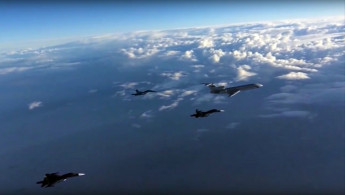Israel-Russia in emergency meeting over Moscow's withdrawal from Syria
This makes Rivlin the first international leader to meet Putin since the announcement and underlines Israel's strategic interests in Syria and close relationship on security issues with Moscow.
Rivilin arrived in Moscow on Tuesday on an official state visit. But the Israeli president, whose post is largely ceremonial, attended emergency briefings with the Israeli prime minister and security chiefs prior to his meeting with the Russian leader.
This is thought to be about coordinating activities between Russia and Israel regarding Syria and the role of Hizballah in the country, the JewishPress.com said.
Rivlin entered an emergency set of briefings with his aides and security advisers on Monday, in an attempt to understand the implications of the Russian pullout for Israel.
According to Israeli press, Rivlin will tell Russian President Vladimir Putin when they meet in Moscow that any future peace agreement in Syria must not end up strengthening Iran and Hizballah.
"We want Iran and Hizballah not to emerge strengthened from this entire process," Rivlin told reporters on a flight Tuesday to Moscow.
"Everybody agrees that the Islamic State organisation is a danger to the entire world, but Shia Iranian fundamentalist Islam is for us just as dangerous."
 |
We want Iran and Hizballah not to emerge strengthened from this entire process - Reuven Rivlin, Israeli president |
 |
A senior official who wished to remain anonymous told Haaretz that Israel is not fully aware of Russia's future intentions in Syria.
Rivlin's goals in the meeting will include discerning Putin's immediate plans and a joint plan of action for the "day after" the Syrian war ends.
"Given the situation we're in, we have to coordinate with Russia," Rivlin said on the plane.
Israel's military chief of staff, Lt. Gen. Gadi Eisenkot, told a meeting of the Knesset Foreign Affairs and Defence Committee on Tuesday that Israel was caught off guard by the Kremlin announcement.
"We had no prior information about the Russian announcement of a reduction in its involvement, just as others didn't," Eisenkot said.
Russian-Israeli military coordination in Syria began in September in parallel with Russia's intervention there.
Israeli Prime Minister Binyamin Netanyahu visited Moscow at the time with a high-level military delegation.
A joint coordination committee was created to avoid conflict in the operations of the two countries' air forces over Syria, where Israel routinely carries out strikes including against arms shipments bound for Hizballah.





 Follow the Middle East's top stories in English at The New Arab on Google News
Follow the Middle East's top stories in English at The New Arab on Google News
![The UAE is widely suspected of arming the RSF militia [Getty]](/sites/default/files/styles/image_330x185/public/2024-11/GettyImages-472529908.jpg?h=69f2b9d0&itok=Yauw3YTG)
![Netanyahu furiously denounced the ICC [Getty]](/sites/default/files/styles/image_330x185/public/2024-11/GettyImages-2169352575.jpg?h=199d8c1f&itok=-vRiruf5)
![Both Hamas and the Palestinian Authority welcomed the ICC arrest warrants [Getty]](/sites/default/files/styles/image_330x185/public/2024-11/GettyImages-2178351173.jpg?h=199d8c1f&itok=TV858iVg)